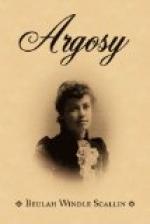Alice stared at her. Had Mrs. Cale’s wits vanished in her illness? “Do you know what you are saying, Nancy?” she cried; “I don’t. What had papa to do with this place? I think you must be wandering.”
Nancy stared in her turn. “Sure, it’s not possible,” she said slowly, beginning to put two and two together, “that you don’t know who you are, Miss West? That your papa died here? and lies buried here?”
Alice West turned white, and sat down on the opposite bench to Nancy. She did know that her father had died at some small country living he held; but she never suspected that it was at Church Leet. Her mother had gone to London after his death, and set up a school—which succeeded well. But soon she died, and the ladies who took to the school before her death took to Alice with it. The child was still too young to be told by her mother of the serious past—or Mrs. West deemed her to be so. And she had grown up in ignorance of her father’s fate and of where he died.
“When we heard, me and John, that it was a Miss West who had come to the Hall to be governess to Parson Dancox’s child, the name struck us both,” went on Nancy. “Next we looked at your face, my dear, to trace any likeness there might be, and we thought we saw it—for you’ve got your papa’s eyes for certain. Then, one day when I was dusting in here, I let fall a hymn-book from the Hall pew; in picking it up it came open, and the name writ in it stared me in the face, ‘Alice West.’ After that, we had no manner of doubt, him and me, and I’ve often wished to talk with you and tell you so. My dear, I’ve had you on my knee many a time when you were a little one.”
Alice burst into tears of agitation. “I never knew it! I never knew it. Dear Nancy, what did papa die of?”
“Ah, that was a sad piece of business—he was killed,” said Nancy. And forthwith, rightly or wrongly, she, garrulous with old age, told all the history.
It was an exciting interview, lasting until the shades of evening surprised them. Miss Kate Dancox might have gone roving to the other end of the globe, for all the attention given her just then. Poor Alice cried and sighed, and trembled inwardly and outwardly. “To think that it should just be to this place that I should come as governess, and to the house of Captain Monk!” she wailed. “Surely he did not kill papa!—intentionally!”
“No, no; nobody has ever thought that,” disclaimed Nancy. “The Captain is a passionate man, as is well known, and they quarrelled, and a hot blow, not intentional, must have been struck between ’em. And all through them blessed chimes, Miss Alice! Not but that they be sweet to listen to—and they be going to ring again this New Year’s Eve.”
Drawing her warm cloak about her, Nancy Cale set off towards her cottage. Alice West sat on in the sheltered porch, utterly bewildered. Never in her life had she felt so agitated, so incapable of sound and sober thought. Now it was explained why the bow-windowed sitting-room at the Vicarage would always strike her as being familiar to her memory; as though she had at some time known one that resembled it, or perhaps seen one like it in a dream.




